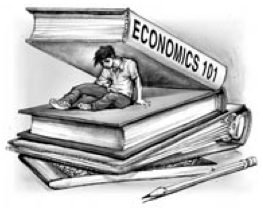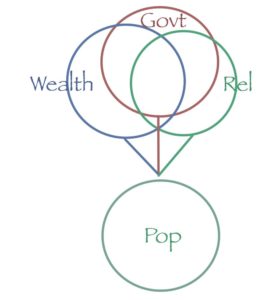
Power of Control Ignored is
the Power to Control
As I was doing my series on ignorance I had an epiphany concerning economics. Nearly everyone I asked had the same reaction to economics as I; i.e., it is too difficult to understand and best left to the “experts”.
That is the first secret of control – ability to exercise the power of control with the consent of those being controlled. Economics has always been in plain sight but considered too esoteric or difficult for the “average joe” to understand. Yes, the “nuts and bolts” of the practice of economics requires certain knowledge not available to people outside of the profession but then so does every other profession such as electrician, medicine and so forth. But the philosophy of economics is quite easily understood once you pull back the curtain to see the person operating the levers (Wizard of Oz reference).
I will show how economics has been used down through the centuries, even before it was called economics and considered a field of study. Now, I am not an economist but I am a fairly good student of history and a philosopher of sorts. I will show how man has used, even unknowingly, economics to achieve control over the governed attempting to thwart God’s plan of salvation. Thus, the chief architect of economics is not man per se but Satan who stands behind the curtains manipulating man through his usual methods of deceit and violence (security concerns).
First, we must comply with the Law of Identity and define economics less we also be guilty of equivocation, changing definitions in our discussions to manipulate you the reader into agreeing with my conclusions. “One of the earliest recorded economic thinkers was the Greek poet Hesiod, who wrote that labor, materials and time needed to be allocated efficiently to overcome scarcity. This is the principle problem of economics: human beings occupy a world of unlimited wants and limited means” (Investopedia). There are several assumptions contained in this definition which may or may not be true. It is true that people have unlimited wants; that is, they want whatever is currently “new” and the new practice of advertising, historically speaking, has certainly created appeal for new things in at an every increasing pace. However, it may not be true that resources are scarce. Since no one knows how much of any material is hidden in the earth no one can make the statement that humanity is running out of any substance (though this mantra is touted often in relation to fossil fuels, potable water and so forth).
However, what I believe to be the most important aspect of economics is not contained in this or even most definitions but is discussed in the same Investopedia article, “Pejoratively known as the “dismal science,” modern economics is primarily focused on the production, distribution and consumption of goods and services. It tries to determine how people, businesses and governments should best associate with each other and organize activity to achieve maximum output.” Notice the concept of control contained in but not specifically mentioned in the quote. This is the true use of economics, the acquisition of power through “tangible means” such as distribution of goods and services, the manipulation of currency and so forth. Seen in this light economics no longer hides behind the curtain but becomes quite visible to everyone just as Satan will appear insignificant once his masquerade has ended and he has been exposed (Is 14:15-17).
Our beginning must start with the Very Ancient Kingdoms. I would direct you my early lessons on Exodus for a more detailed discussion of this time period (Understand the Ancient World, Understand Ancient Faiths, Understand Ancient Egypt). These Very Ancient Kingdoms were based upon Nimrod’s prototypical government which combined government and religious leadership in one person (Ge 10:8-14; 11:1-9). God chose to make an example of Egypt. Through Joseph God made Egypt very powerful, especially economically, among the Very Ancient Kingdoms (Ge 47:1-26); conversely, He also made Egypt very weak when He brought the Hebrews out of Egypt (Ex 12:33-36). I have developed a schematic that we will use throughout these discussions showing the changing relationships between the various elements of society involved with the changing economic relationships, as I understand them. The ruler (Government (Govt)) is one element; Religion (Priesthood (Rel)), Wealth (Sources of financial instruments) and the governed (Populace (Pop)). In the Very Ancient Kingdoms the Ruler (Pharaoh in Egypt) was both the government and the chief priest or god who functioned as an intercessor between his society and the gods and goddesses in the “spiritual” world to which they were going. The ruler also was the source of wealth along with certain members of his government to include the military leaders. This was pattern set by Nimrod and remained in place until after the events in Exodus when God developed a different structure with the Hebrews. God separated the priesthood from the government so that the two were not controlled by one person. This is observed in later cultures when the ruler was no longer considered a “god” but just another person who set the example of “worship” through the priesthood for everyone else.

One Person Wore Three Hats
Very Ancient Kingdoms
Notice that in the Very Ancient Kingdoms control flows in only one direction while the means for obtaining the “tangible means” of power require the use of the Pop (Population) in the form of labor. The general population provided the labor for the military, lower echelons of government and certainly for the many projects of the government as well as the suppliers of food for the government and the priesthood. Everyone was considered “saved” as long as they did not unset the “balance” that the ruler-god had developed with the spiritual gods. Rituals were to please the gods but did not involved a personal morality as given by God in the Ten Words (Commandments in the Church Tradition).

Priesthood Semi-Independent Entity
Ancient Kingdoms
There was a fundamental shift in the Ancient Kingdoms after the events in Exodus influenced the Very Ancient Kingdoms. Notice that the Priesthood (Rel) is separated from government (Govt) and Wealth. The importance of religion cannot be overstated. Government legislates morality, that is its main function as well as defense (projection of military {cultural} power). The “oil” the fuels this process is wealth. Since there was little industry wealth was obtained primarily through taxation of trade and raiding the treasuries of others through conquest. But the fundamental definition of morality comes through the culture’s religion which was mediated by those who explained and promulgated its beliefs. This became a strong power center within society in its own right. The Egyptian Pharaoh (Amenhotep IV, Amenophis IV, or Akhenaten) copied the monotheism of the Hebrews, since it has more powerful than its panoply of gods. He was able to maintain this during his lifetime but upon his death the strong priesthood revered the kingdom back to its original cultural forms of worship.
Notice, there was no separate wealthy class outside of the government and priesthood; however, this does not negate that “tangible means” of wealth were used to control and direct the populace to support and further the aims of government which was supported by the priesthood. The Very Ancient Kingdoms and Ancient Kingdoms had a simplified structure since they did not have an industrial component to their societies, not as was developed in Western culture and promulgated throughout the world as is the case today. In fact, this form was maintained throughout the Medieval Period though there were experimentations between the various elements. The Greeks experimented with elected rulers over their city-state governments. However, these governments were marked by frequent disruptive wars and weakened governments that could not project power effectively. The Romans copied part of their model and part from the Ancient Kingdom model from the Etruscans to evolve from a kingdom to a republic to an empire based on Emperor worship. The latter was the basis of morality that held the diverse empire together while allowing other local religions (sources of morality) to exist. This ended when the Emperor adopted a form of Christianity as his basis for morality which became the Roman Catholic Church (RCC). The RCC continued after the Western Roman Empire collapsed providing direction and power for various medieval kingdoms. The RCC tried to incorporate the government and religion into one person, Pope, but could not quite make the transition. The Medieval Period began to collapse in the face of the burgeoning nation-state era. The newly forming nation-states aligned either with the RCC or the newly developing Protestant religions as the basis for their morality. Thus, the “religious” wars were not really about religion but about political power and the survival of the new nation-states.
This brings us down to what is commonly called, the Modern Era. This period transitions from the Ancient Kingdom model to what I have called the Early Nation-State Industrialization model which we will discuss in our next post. I have discussed the Very Ancient and Ancient Kingdoms down through the Medieval Period in very simplistic terms to provide a foundation for our discussions. While I have omitted certain important influences such as the growth of various cultural religions occurring during the Axial Age, I believe that keeping it simple (KIS) will help us understand the role of economics better. Remember, economics is the “elephant in the room” that few believe they can understand but controls everyone in the room. The control of “tangible means” controls everything from raw materials to finished products and the development of concepts into practical applications in every aspect of our society. And in the background behind the scenes is the grand architect, Satan, pulling the strings to achieve his grand plan unbeknownst to the majority of mankind. He is the master of disguise, deception and violence from the beginning (Jo 8:44). We cannot hope to understand the present, and the future that it predicates, if we do not learn how we are manipulated in our beliefs of our society in relation to other societies as we transition from the nation-state model toward a regionalization model that seeks to end in a globalization model. Globalization in and of itself is not evil. When Christ returns He establishes a globalization society. The issue is one of truth. Satan seeks to establish globalization to snuff out the truth of the Gospel which can set people free from sin. This is the problem with his, and thus man’s, implementation of globalization – control over truth. This is the chief goal of all Satan does and yes, he does indeed use economics to the end.
